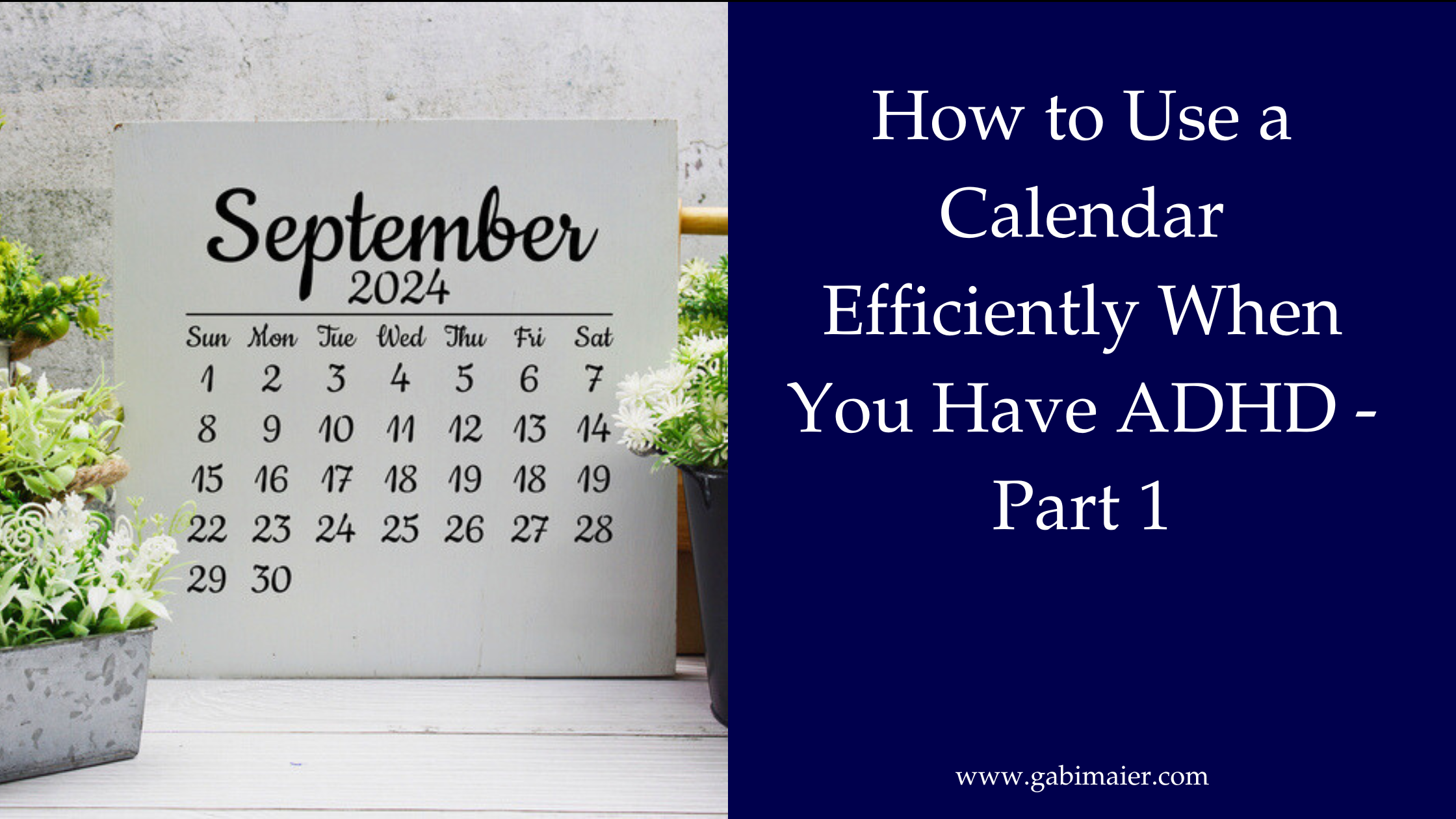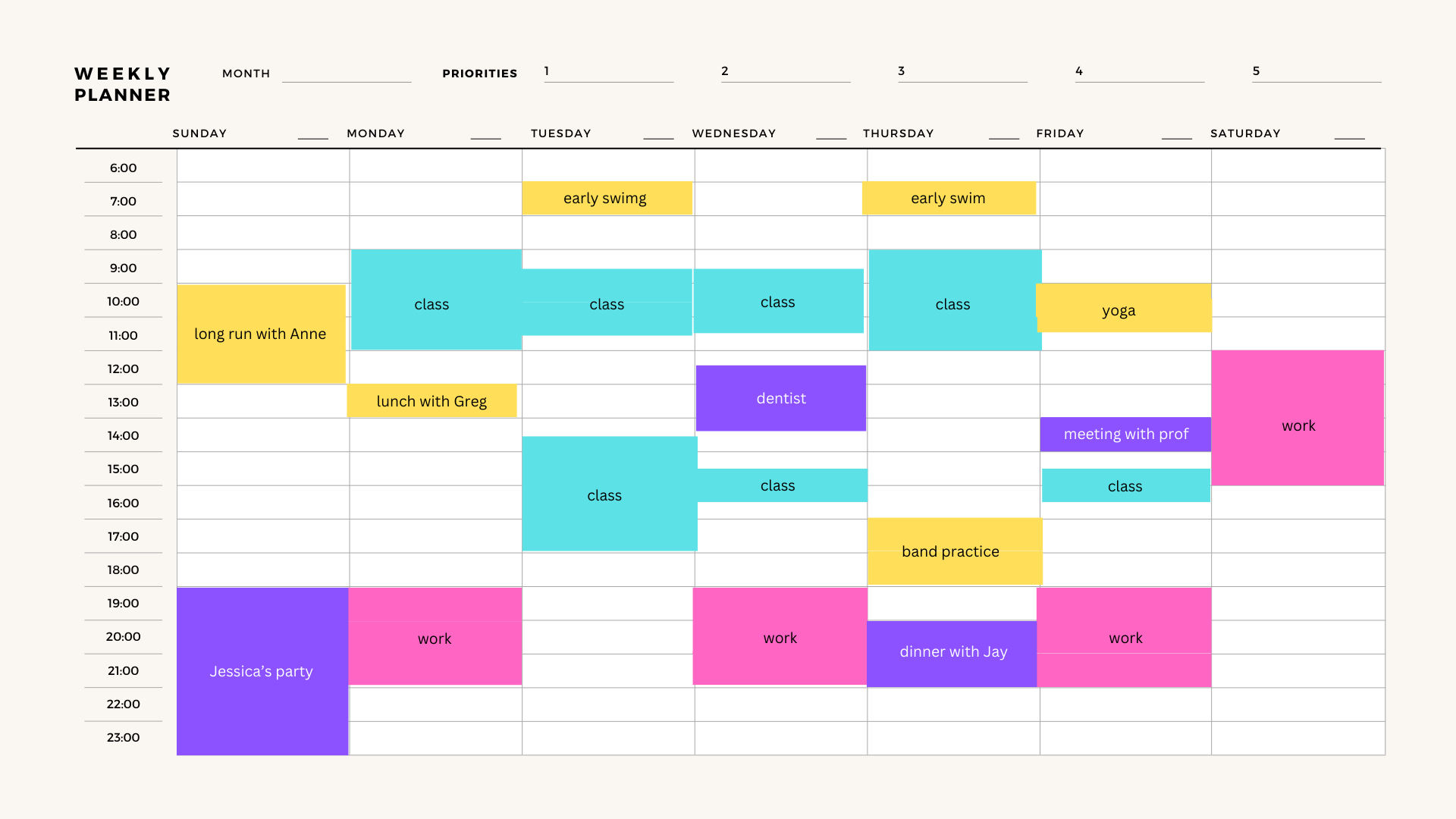How to Use a Calendar Efficiently When You Have ADHD - Part 1
Do you have a calendar? Do you like writing things down in a specific place so that you won’t forget them? Or do you have lots of post-it notes flying around in your apartment and loose paper with important information?
You might have heard it a thousand times, but keeping a calendar when you have trouble remembering appointments or deadlines can really be a lifesaver. A calendar can function as your best friend and accountability buddy. A calendar tells you about deadlines, exams, homework assignments, meetings with friends and doctor’s appointments. It structures your week and helps you organize your day.
The moment you know when a deadline is coming up you can work proactively toward that deadline. A calendar can make you feel calm and in control since it takes the guessing out of your life. You know what is expected from you. A calendar is your roadmap – no matter whether it is on paper or in digital form. You can use an app or a notebook – as long as you note down all important dates, you are good.
At first, it might sound tedious to note down everything in your life, but over time you might come to love it. We all need accountability buddies, and a calendar is a cheap and easy way to stay on track.
But how exactly would be a productive way to use a calendar, scheduler or planner? How do you make sure that everything is actually recorded and that you won’t forget important events or, even more significantly, tests, exams or research papers?
To get started, choose the calendar that is right for you. Some people might prefer a notebook, others put their paper calendar(s) on their fridge and others use a digital version that they carry around on their phone. There are a number of apps you can try out and see if they help you get organized. Maybe you will need all of the above – but maybe one version will be enough for you. You need to experiment in order to know what is right for you.
I, personally, prefer a digital version since it is easier to make changes right away when an event gets canceled or a test is moved to a different date. I like to keep my calendar as current and accurate as possible – and that’s sometimes hard to do with a paper version.
When you choose a calendar, make sure that the days of the week are divided into hourly slots. Don’t choose a scheduler that only lists days – you need those hourly slots in order to determine exactly when you are able to do what.
Once you have a calendar you like, you can get started. As a first order of business, mark all known dates for tests, exams, presentations or deadlines for projects and research papers. If you do not know the exact date, put in an approximate one until you have more certainty. It’s important to have a good overview of your weeks and months ahead of you so that you know how much time you have left for your various exams and projects.
Next, note down all of your classes in school or university that you need to attend each week. If you work a job, do the same with all the hours you have to spend at work.
Next, schedule recurring events – do you go to the gym or visit a specific yoga class on a regular basis? Do you take music lessons or play in an orchestra or band? What about that long-standing meeting with your girlfriends every first Monday of the month?
Then, record all your single events such as a doctor’s appointment, a concert or a meeting with your professor or supervisor.
Last but not least, put in the approximate time when you get up, have breakfast, eat lunch and dinner. That way you have a pretty comprehensive overview of your day – even if it’s just a tentative one.
Once you know how much time is taken up by your job, classes, appointments and hobbies, you have a good idea as to how much time is left for studying. Put those potential study times on your calendar and count up the hours you can spend on school stuff every week. Now your calendar is pretty full but you can see exactly how studying fits - or doesn’t fit - into your day.
Do you think you will have enough time to get your course assignments done, study for potential tests, prepare for a presentation and tend to your hobbies and leisure activities? If not, what do you need to eliminate from your calendar – if only temporarily – to give yourself more space?
In order to get a better sense of how long certain tasks will take, break your chores for the week into small chunks and allocate certain timeframes to them. If you know that you need to read a book for a class, go by the number of pages. If the subject matter is not too complex, you might be able to read 20-30 pages per hour. If your book has 150 pages, you know you might need 5-6 hours to finish that book. Where can you fit those 5-6 hours into your calendar? Do you have time in the afternoon? Do you need to get up early to get some reading done? Or will you fit in a few pages before bed?
Do the same with all of your homework assignments. Estimate how many minutes or hours it will take you to finish a task and then mark your calendar accordingly.
As a rule of thumb, err on the side of caution and create liberal buffer zones in case you cannot focus, get frustrated with the task or need to ask a friend for help. The more time you allocate, the calmer you tend to feel and the less pressure you put on yourself.
Feeling overwhelmed by tests and exams and don’t know how to handle those? Here are a few more tips: Depending on the length and content of your exam, you might need to start early. As you did with your reading assignment, break down your exam into different subject matters and then allocate certain hours or days to them. For example, if you need to study for a French test, you might need to cover a certain number of new words, grammatical structures and a specific cultural knowledge (from a textbook or handouts). Those are the different parts you need to practice.
For a week, allocate certain times a day to your French test. On Monday, spend an hour on French. Split that hour into two parts - into a 15 und a 45 minute-slot: first study new vocabulary (15 minutes) and then move on to grammar (45 minutes); on Tuesday spend 30 minutes on new words and 30 minutes on French grammar; on Wednesday you only do 15 minutes of French words because you are pressed for time that day. Over the course of the week, you will cycle through all of the different parts for your exam without feeling rushed or stressed out.
Apply the same strategy to any other test, exam or larger project such as your term paper – break them into smaller parts and assign specific time slots to those parts. I will be writing a separate article on how to plan and execute research papers in the near future to give you more specific guidance.
It might take a while to get comfortable structuring your day in this way but the more you practice the better you will get at it. Take it easy and start small. It takes some time to use a calendar efficiently, so be patient with yourself. If you run into problems, ask your friends, parents, family members or a professional coach for help and support.
I wish you all the best on that new exciting adventure!






